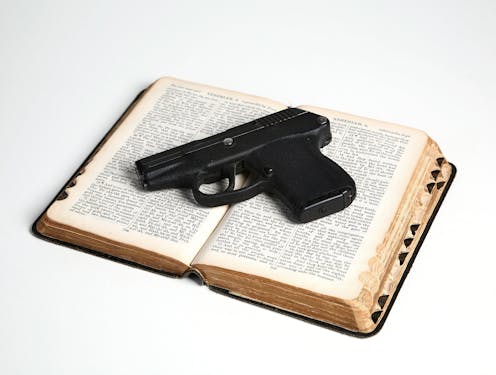God and guns often go together in US history – this course examines why
- Written by Joseph P. Slaughter, Assistant Professor of the Practice in Religion and History and Associate Director of the Center for the Study of Guns and Society, Wesleyan University

Together, we explore digital and archival sources that show a wide range of attitudes toward weapons. For example, the abolitionist John Brown’s prison letters[11] provide a fascinating window into how faith and firearms can be central to someone’s cause. Brown was a Christian who believed so strongly in abolishing slavery that he was convinced God had appointed him as his agent of violent judgment. The letters were written just prior to Brown’s execution in 1859, after his failed attempt to spark a slave uprising in Harper’s Ferry, Virginia (now West Virginia).
Why is this course relevant now?
Americans live in a country where politicians’ platforms often focus on God and guns.
Some are overtly weaving it into their election pitch, such as U.S. Senate candidate Josh Mandel[12] of Ohio, who called himself “pro-God, guns and Trump,” while other Republicans such as Colorado Rep. Lauren Boebert and Kentucky Rep. Thomas Massie included guns in Christmas messages[13].
What’s a critical lesson from the course?
American Christians, including evangelicals, are a diverse lot. The “peace church” tradition – the Mennonites, Amish and Quakers, among others – may not often grab headlines, but complicate the narrative about guns and God in U.S. culture.
Many other types of Christianity do not embrace firearms[15], either. For example, Pew Research found that only 52% of Black Protestants have fired a gun, compared with a 72% average among all Americans[16].
Yet from the time of the Puritans onward, many Christians have viewed America as a divinely inspired nation[17] – an idea that often served to sanction violence, whether in a war for Indigenous lands, defending slavery or leading a revolt.
What will the course prepare students to do?
Hopefully this course will equip students to coherently answer the question of why American religious culture is so intertwined with gun culture – especially if the subject comes up at Thanksgiving dinner.
More seriously, the better that people in America understand how their predecessors viewed firearms, the more robust and productive debates will be over their place in American society today[18].
References
- ^ Uncommon Courses (theconversation.com)
- ^ a religion professor (jslaughter01.faculty.wesleyan.edu)
- ^ 41% of white evangelicals (www.christianitytoday.com)
- ^ a historian of the 18th and early 19th centuries (muse.jhu.edu)
- ^ hymns of celebration (www.biblegateway.com)
- ^ defeating enemies (www.biblegateway.com)
- ^ the Sermon on the Mount (www.biblegateway.com)
- ^ when firearms, religion and violence were intertwined aspects of settlers’ lives (wwnorton.co.uk)
- ^ masculine, warriorlike idea of Jesus (wwnorton.com)
- ^ Corbis Historical via Getty Images (www.gettyimages.com)
- ^ John Brown’s prison letters (rowman.com)
- ^ Josh Mandel (finance.yahoo.com)
- ^ included guns in Christmas messages (www.nbcnews.com)
- ^ AP Photo/Matt York (newsroom.ap.org)
- ^ do not embrace firearms (www.abc.net.au)
- ^ a 72% average among all Americans (www.christianitytoday.com)
- ^ have viewed America as a divinely inspired nation (press.princeton.edu)
- ^ in American society today (gunsandsocietycenter.com)
Authors: Joseph P. Slaughter, Assistant Professor of the Practice in Religion and History and Associate Director of the Center for the Study of Guns and Society, Wesleyan University

